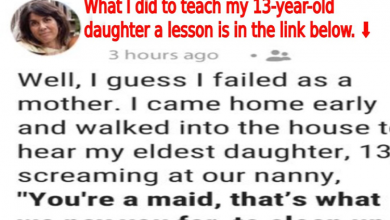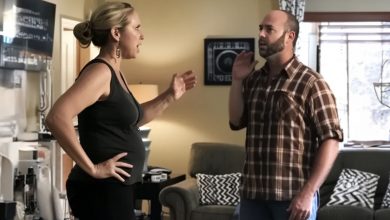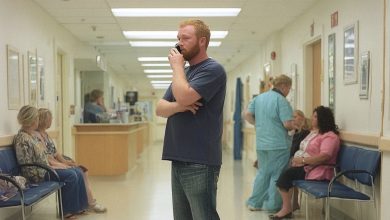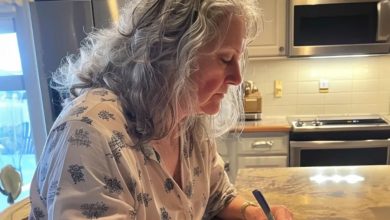At My Sister’s “Perfect” Engagement Party, I Was the Punchline — One Search Turned the Room Silent

My sister told me, “Don’t say anything,” and led me to a small table near the back door, as if quietness could be assigned a seat.
The backyard looked like a wedding magazine photo — glowing lights hanging between trees, soft music from a speaker that wanted to sound like a real band, white roses in glass jars, and tables dressed in fabric so neat it almost looked scared to wrinkle. Everything was meant to look simple, but it took a lot of work and money to make it that way. Vera loved control. Nothing made her happier than people saying, “It’s perfect,” even if that perfection came at someone else’s expense.
A young server walked me past the main table — Mom and Dad smiling wide, Vera’s friends with their expensive hair and fake laughter, her fiancé’s family lined up like judges at a show. Then I reached my assigned seat: Table 9, behind a half-open door, close to where the waiters carried plates and the air smelled faintly like disinfectant. There were two folding chairs and a tired bouquet that looked ready to give up.
I put my small clutch on the table and sat down. Every few minutes the bathroom door opened, releasing a breath of cleaning spray. From somewhere behind me, a voice said, “Guess this is the overflow table, huh?” I smiled politely without answering. I was used to that tone — the mix of curiosity and pity people use when they think they’ve figured you out.
Across the yard, Vera stood under the lights. She looked like the star of her own movie — perfect curls, a white dress that floated just enough, a laugh timed to pull every eye toward her. I used to believe she didn’t realize how much she performed. Now I know she always did.
A woman in lavender sat beside me. “You must be Vera’s sister,” she said kindly.
“Yes,” I answered.
“What do you do?” she asked.
Before I could reply, Vera’s voice rang across the yard, clear and cheerful. “Oh, Delara handles emails and office stuff,” she said, laughing lightly. “She’s great with folders and labels.”
The people nearby chuckled like it was harmless fun. I could feel my cheeks warm, but I smiled and said nothing. The woman next to me nodded with sympathy. “That’s important too,” she said softly.
What I didn’t say: I own a company that invests in start-ups across three countries. I sit on boards. I’ve built things Vera will never understand. But I’ve learned that explaining yourself to people who don’t care to listen is just another form of begging.
Mom waved at me from her seat, a small distracted wave, like she was already done with it before it began. Dad was talking with Vera’s fiancé and his friends, nodding in that familiar way — trying to sound important among men who didn’t notice his effort.
I took a sip of wine. I had promised myself I wouldn’t cause trouble. In my family, silence was the only acceptable defense.
When Vera picked up the microphone, the speaker squeaked before obeying her voice. “This night wouldn’t have been possible without our parents,” she said, smiling toward Mom and Dad. “Lenora and Calvin, thank you for your generosity. You made this dream come true.”
Applause filled the garden. My name wasn’t mentioned, though I’d quietly paid the deposit for the venue and approved the floral budget. She had called me weeks earlier whispering, “It’s just a small favor — let’s not tell Mom. You know how she worries.” I had agreed, because that’s what sisters do.
Now, listening to her speech, I realized my silence had been her stage.
From across the tables, Alaric — her fiancé — looked at me. Tall, confident, polite. His expression shifted slightly when our eyes met, as if he’d suddenly noticed there was more to the room.
When the crowd started talking again, he walked toward me. “You work in finance, right?” he asked.
“Yes,” I said carefully.
“What kind of finance?”
“Venture capital,” I answered.
He nodded, curious, and took out his phone. “What’s your firm’s name?”
I told him. His thumbs moved fast. Then his eyes widened. The glow from the screen lit his face as he read. He turned it toward me — my photo, my name, and an old article: ‘Under 40 Female Founders to Watch’.
“That’s you?” he asked quietly.
“Yes.”
Before either of us could say more, Vera appeared. She glanced at the screen, laughed lightly, and said, “Oh, that old list? It’s silly.” Then she turned to him with a perfect smile.
Alaric said nothing. He just looked at her, then at me, and slipped the phone back into his pocket.
Mom clapped her hands loudly. “Everyone, dessert time!” she announced, the way she always did — controlling the room without appearing to.
As people moved around, my aunt Carol came up behind me. “Let’s not make a scene,” she whispered. “It’s Vera’s big night.”
That was the final straw.
I stood and walked inside, where a printer sat near a tray of extra menus. A sheet of paper had just printed. I picked it up without thinking. It was an email — Vera to the planner: Keep my sister away from the mic. She tends to make things about herself. Also, her dress might distract people.
I folded the paper and carried it outside. Vera stood near the hydrangeas, fixing her neckline. I handed her the sheet. “This printed by mistake,” I said.
She read it. Her smile faded, then came back, smaller. “Oh, that was a draft. You’re taking it too seriously.”
“No,” I said quietly. “I’m just done pretending.”
Mom arrived, drawn by tension like a moth to flame. “A misunderstanding,” she said gently. “Everyone’s tired. Let’s not ruin the mood.”
“This isn’t tiredness,” I replied. “It’s habit.”
I walked straight to the main table and opened my clutch. Inside were two envelopes. One contained the signed contract for the event — my name beside the payment details. The second was the original invitation proof, the one that had said Hosted by Delara Thompson before Vera had it reprinted without me.
I placed both on the table. “I won’t sit quietly in a room I paid for,” I said.
The air went still. Someone whispered, “She paid for everything.” Phones came out. People stared at Vera.
Alaric sat down, his jaw tight. “You knew,” he said softly.
“It wasn’t relevant,” Vera answered.
“It wasn’t convenient,” he corrected.
No one spoke after that. Even the music seemed to pause. I turned, picked up my clutch, and walked toward the gate. No shouting, no drama. Just the truth doing its work.
A woman near the fire pit asked, “Aren’t you the donor for the women’s tech fund last year?”
“Yes,” I said simply.
Murmurs spread. People looked at Vera differently now. My mother stood frozen, unsure which side to face. I walked past them all and out through the gate.
The night air was cool. I breathed it in and felt lighter than I had in years.
That night I drove home through quiet neighborhoods. My apartment waited, clean and calm. I made tea and stood by the window, watching city lights flicker like tiny confessions. For the first time in a long while, I slept peacefully.
Three days later, a package arrived — my first published book, sent by my father. Inside was a note in his handwriting: I read this twice. Once to see what you wrote. Once to hear you.
I cried, just a little. Then I called him.
“Hey, sweetheart,” he said softly. “I should have known more. I should have asked.”
“You looked where Mom pointed,” I said. “I stopped trying to shout through closed doors.”
He paused. “Can we try again? From here?”
“Yes,” I said. And that yes felt like a small door opening.
The internet, of course, did what it always does — turned gossip into headlines. Pictures from the party disappeared; new ones appeared. I didn’t care. I’d stopped caring about stories told by people who never asked for the truth.
A week later, Alaric emailed. He didn’t make excuses. He just asked if I’d meet him for coffee.
We met at a small café with the smell of roasted beans and rain.
“I’m sorry,” he said immediately. “I believed what was easiest. That’s on me.”
“Most people like simple stories,” I said.
“I chose Vera because I liked how she edited the world,” he admitted. “I thought I could live in that version.”
“I’m not your warning sign,” I said. “I’m just someone who got tired of being quiet.”
He nodded. “She sent me reasons for why it was all a misunderstanding. I told her misunderstanding is just ignoring on purpose.”
We drank in silence. It was a good kind of silence — the honest kind. When we said goodbye, he hugged me gently, like someone who understood too late but still meant well.
Months passed. Dad and I started having dinners again. We talked about work, about courage, about small steps that fix big mistakes. Once, he gave me a photo of me as a child holding my blue-ribbon painting — the one Mom had thrown away. On the back he’d written: I should have framed this. May I do it now?
“Yes,” I said.
And he did.
I met Vera again months later on a snowy sidewalk. She looked surprised to see me. Her friends glanced between us, unsure.
“I read your book,” she said. “You’re talented.”
“Thank you.”
“I didn’t know you wrote under your own name.”
“You didn’t want to know,” I said.
She looked down. “Our wedding is in June. I hope you’ll come.”
“I hope it’s a wonderful day,” I said. That was enough.
Later that winter, Mom sent a handwritten letter — her first in years. It said, I read your book. It wasn’t for me, but it was true. I’m asking myself if I was a good mother to both daughters or just the one who made life easier. No answer yet. I started reading again from chapter three.
No apology. But honesty, finally. That was enough.
Spring came. I attended an event for the women’s fund I’d helped build. A young woman told me her daughter wanted to apply. “She says you look like the future,” she said.
“Tell her to look like herself,” I answered. “That’s how the future begins.”
When Vera’s wedding invitation arrived, I checked the box for “Regrets.” Instead of gifts, I made a donation to a shelter for women escaping abuse — in their names. I wrote nothing else.
On the day of her wedding, I drove to the coast. I watched waves rise and fall, children laughing as they rebuilt sandcastles again and again. I felt calm.
If you’re waiting for a perfect ending, there isn’t one. Family isn’t perfect. It’s a house full of rooms, some warm, some locked. Sometimes we fix what’s broken. Sometimes we walk away.
I didn’t learn to be loud. I learned to be clear. I learned that staying quiet keeps the peace the same way a closed door keeps out the light. You can’t make people see you by shrinking. You stand tall, and they adjust their eyes.
Now, when people ask what I do, I say, “I build things that make space for others.”
If they want numbers, they can look them up. If they want the truth, they can stay and listen.
These days, I cook dinner for friends who understand that kindness isn’t weakness. We eat, laugh, and fill the room with voices that don’t compete. When everyone leaves, I look at the framed painting — the girl on the bicycle riding into the storm — and I smile.
She isn’t afraid. Neither am I.
My name is Delara Thompson, and I’m no longer the quiet sister in the corner. I’m the woman who brought the receipts, walked away, and finally gave herself permission to take up space.
If anyone ever seats you near the back door, remember: silence isn’t safety. Speak. Stand. The right people will move their chairs closer.
The party is over now. The lights are still shining. And I am, finally, home.










